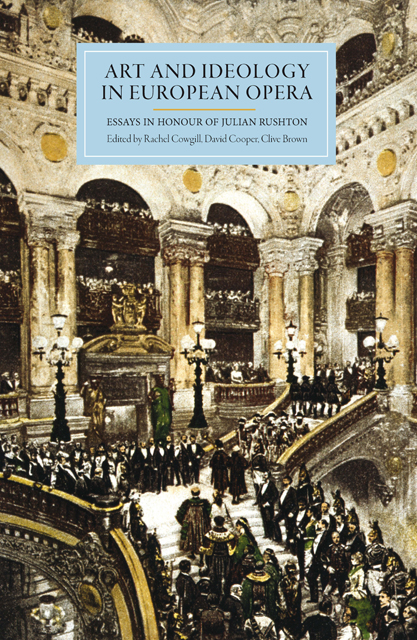Book contents
- Frontmatter
- Contents
- List of Figures
- List of Music Examples
- List of Tables
- Notes on Editors and Contributors
- Acknowledgements
- Introduction
- I Nationalism, Cosmopolitanism and National Opera
- II Opera, Class and the Politics of Enlightenment
- III Opera and Otherness
- Julian Rushton: A Family Memoir
- 7 The Works of Julian Rushton
- Index
- Tabula Gratulatoria
12 - Beyond the Exotic: How ‘Eastern’ Is Aida?
Published online by Cambridge University Press: 28 February 2023
- Frontmatter
- Contents
- List of Figures
- List of Music Examples
- List of Tables
- Notes on Editors and Contributors
- Acknowledgements
- Introduction
- I Nationalism, Cosmopolitanism and National Opera
- II Opera, Class and the Politics of Enlightenment
- III Opera and Otherness
- Julian Rushton: A Family Memoir
- 7 The Works of Julian Rushton
- Index
- Tabula Gratulatoria
Summary
As all opera-lovers know, Verdi's Aida invokes an imagined ancient Egypt in its ballet numbers, incantations by priests and priestesses, and in the atmospheric opening of Act 3 (set by the banks of the Nile at night). At the first performances (Cairo, 1871), Filippo Filippi reported ‘an “Oh!” of admiration’ and a ‘cry of astonishment from the audience’ at these various scenes of local and historical colour: ‘And the music was not the least part of it, what with its hieratic colour and with the Oriental hues of the dances, whose rhythmic motives are still heard today here [in Egypt] in the traditional manner, hummed by the natives’.
Almost every commentator on the opera has followed Filippi's lead in linking specific musical traits with the Egyptian elements of the plot, and it is just as easy to identify a plain association of ‘Ethiopia’ with descending minormode tunes (or oscillating major-minor-mode tunes), especially when they are introduced or doubled on the oboe. But does the opera as a whole reflect attitudes (admiring, idealized, deploring, anxious …) toward Egyptians or Ethiopians, whether ancient or modern? Can these attitudes be understood as sustained throughout the opera, rather than confined to those few, scene-setting moments, with their odd scales and other devices for indicating Otherness? This question prompts another that at first sounds quite distinct: How does Aida portray the advantages, challenges, morality and price of Egypt's imperial rule over Ethiopia? The two questions are related by the fact that to establish and maintain an empire often entails a systematic Othering of a whole distant (or sometimes neighbouring) people, turning them into a category of not-Us, and thereby into objects to be dehumanized, possessed and used for Our own purposes (for example, enslaved, as here), when not simply raped and mass-murdered on the spot.
Julian Budden has linked the two considerations, though in a wording that proves problematic. He notes regretfully that, for audiences and critics in recent decades, Aida has ‘turned […] just a little sour’ because of its acceptance of Egypt's oppressive authority, and yet, he asserts, the work is marked by a ‘complete absence of racialist and fascist overtones’.
- Type
- Chapter
- Information
- Art and Ideology in European OperaEssays in Honour of Julian Rushton, pp. 264 - 280Publisher: Boydell & BrewerPrint publication year: 2010



